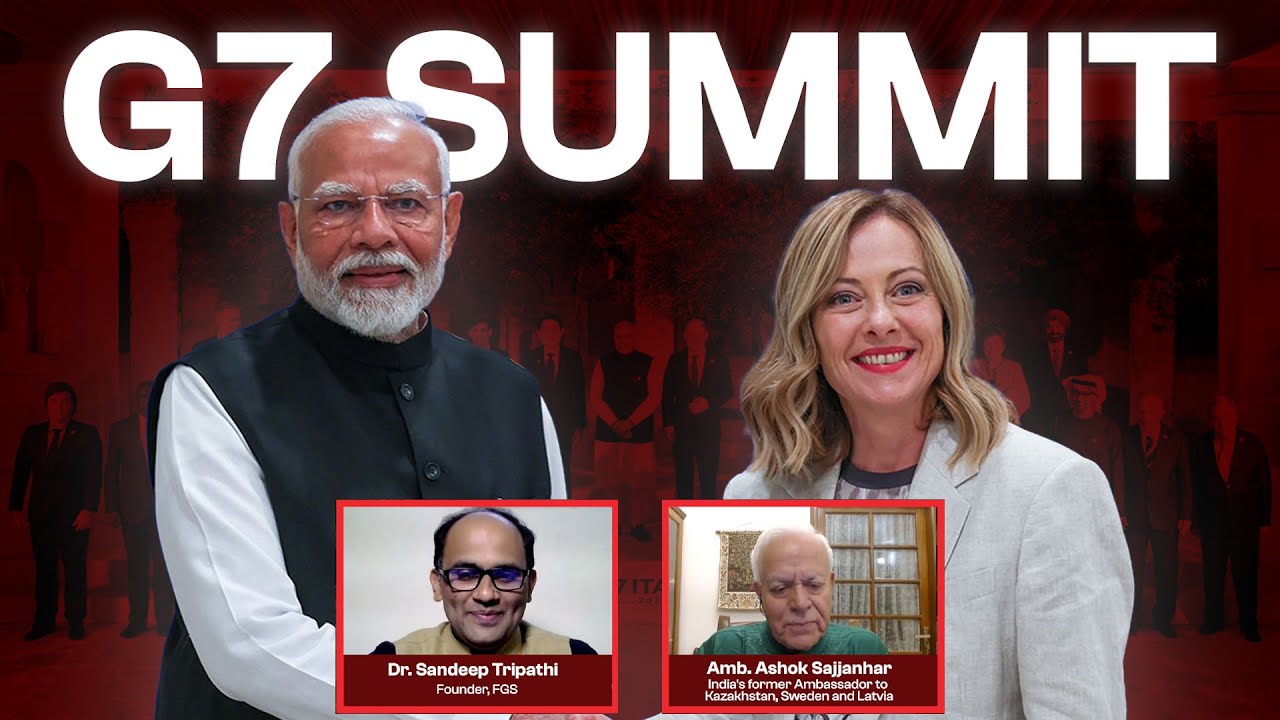The podcast episode titled “Ambassador Ashok Sajjanhar on G7 Summit 2024 | PM Modi at the G 7 Summit, Italy” was hosted by Forum For Global Studies, a Delhi based multidisciplinary thinktank. Dr Sandeep Tripathi moderated the session and the talk featured Ashok Sajjanhar, IFS(Retd), former ambassador to Latvia, Sweden and Moscow. The discussion focused on India, Iran and Chabahar Port.
Dr Tripathi began the discussion by introducing Amb. Ashok Sajjanhar and welcoming him on the podcast. Dr. Tripathi opened the podcast by questioning the strategic imperative of India-Italy friendship, the leverage it provides India in global politics, citing the post put by Italy’s Prime Minister Meloni. Dr. Sajjanhar supported his answer by stating the importance of social media in geopolitics and the role it plays as a tool of soft power. He discussed how the nature of the relations between two countries depends on the shared interests. He talked about the strategic deals signed between India and Italy in the field of trade, Indo-Pacific stability, artificial intelligence, etc. Later Dr Tripathi asked about India’s stance as ‘voice of global south’ and the implication of the Indian Prime Minister’s visit to Italy as his first foreign visit after bearing his oath. Amb. Sajjanhar mentioned the presence of India at all past G7 meetings, though not being a de jure member of G7 grouping, stating India’s position in global politics. Amb Sajjanhar also discussed the key elements India has brought on global dais during its G20 presidency. He emphasized India’s pivotal role in achieving consensus on the New Delhi Leaders’ Declaration at the G20 2024 summit, organizing the Voice of the Global South summit, and facilitating the African Union’s inclusion as the 21st member of the G20.
Amb. Sajjanhar pointed out the importance of India for G7 nations due to its market capacity, developing economy and manpower, highlighting the need for collaboration between G7 nations and India. Dr Tripathi raised concern over G7 policy makers’ hesitancy over including emerging economies in G7 grouping, thus questioning the inclusivity principle propagated by G7 nations. Mr. Sajjanhar, stating his varied stance, clarified that the G7 nations understand the importance of collaborating with the Global South.
He particularly highlighted the significance of the first Indo-Pacific strategy introduced by Shinzo Abe to ensure a prosperous global order. He explained that the G7 nations recognize the importance of multilateralism for maintaining a stable global order and emphasized their efforts to promote it. Dr Tripathi questioned the controversy raised in the G7 summit with the nations agreeing to raise money for Ukraine in war by leveraging the frozen Russian assets, thus provoking Russia for further escalations. Amb Sajjahar raised his concern about the controversy that it can further deteriorate the situation. Both the scholars discussed the importance of a sustainable global economy and the concurrent fragile geodynamics reshaping the global order.
With the ongoing wars and their repercussions on world politics, Dr Tripathi questioned if the G7 summit offered a solution to the conflicts. He further raised questions over any expected measure by G7 nations over the Climate Change issues as proposed by most of the G7 nations in their election manifesto. Amb. Sajjanhar explained the role of the G7 group not as a negotiating body but a consultative group, wherein agreements are reached upon and then out into bilateral negotiations among the nations. He emphasized India’s autonomous stance on Russia-Ukraine war and also the necessity of ceasefire between Israel-Hamas war to contain the global destruction. Amb Sajjanhar further elucidated on India’s progress towards mitigating climate change effects with INDCs and carbon neutral commitment along with developed countries. Amb Sajjanhar concluded the podcast by discussing the ongoing elections in the majority G7 nations and their implications on global governance.

